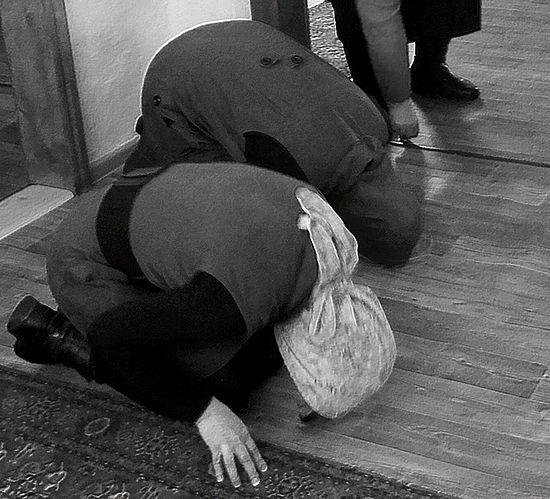But rather a spirit of chastity, humble-mindedness, patience, and love bestow upon me Thy servant.
In the name of the Father, the Son, and the Holy Spirit!
In our previous discussion, dear brothers and sisters, we dwelt upon the prayer of St. Ephraim the Syrian and said that it is a profound prayer, filled with feelings of repentance and humility, and that every word of it finds a response in our souls and helps us to recognize our passions and vices and desire the virtues, without which no one can come closer to God. The last time we discussed the first four requests, in which St. Ephraim the Syrian asks the Lord not to give him the spirit of idleness, despondency, ambition, and idle talk. And now we continue our discussion.
In the fifth request the saint asks the Lord to give him the spirit of chastity. By chastity in the general sense we must understand the total, grace-filled, unspoiled state of man—his honesty, truthfulness, purity of heart and mind, the good intent of his will, and so on. For a chaste person all of life is chaste; he is alien to deceit, duplicity, wavering, crude pleasures and secret lusts. The foundation of such a life is in a strong and unbroken life in God.
In the more narrow and common sense, this word signifies a person’s pure, virginal state of soul, when he guards himself not only from fleshly sins but also from all sensuous thoughts and desires. Nothing makes us so pleasant and amiable to God than chastity, and nothing so adorns people of all ages as a pure, chaste state of soul. As a fresh, pure flower is fragrant with its tenderness and pleasant to all, so also is a chaste person wholesome and clean.
Meanwhile, God’s word reveals to us that in the world, corruption rules through lust (cf. 2 Pet. 1:4), that even people’s care for their flesh turns into lust (cf. Rom. 13:14), and therefore He warns us of this, so that we would abstain from fleshly lusts (cf. 1 Pet. 2:11) and mortify evil lust in ourselves (cf. Col 3:5).
The Word of God also reveals to us that the fornicator is not only the man who actually fornicates, but also the man who looks with lust at a woman. Therefore let us guard the chastity, purity, and virginity of our souls and hearts. Let us remember that chastity is a treasure; more than that—it is our sacred shrine, as St. John Chrysostom says.
How do we do that? It is natural for people to have shame. Preserve and develop it. In it is the natural foundation of our chastity, of our virginity of soul and body. We have to spurn our admiration of our own bodies, for this is the source of secret pleasures and lusts. Don’t look straight at the faces and figures of people you meet. Do not read anything seductive or bad. Finally, we have to suppress and uproot in ourselves lustful thoughts and desires, and more than that, hate them as the spawn of the lowest elements of our nature. We have to gaze more often at the eternal and perfect purity of the Most Pure Virgin Mary and have recourse to prayerful communion with her, the root of virginity and unfading light of purity; and most importantly, we have to turn to the Lord in prayer:
O Lord and Master of my life, the spirit of chastity bestow upon me Thy servant.
In the sixth request, St. Ephraim asks the Lord to give him the spirit of humble-mindedness. By humble-mindedness is meant a person’s profound awareness of his spiritual poverty, at which he counts himself worse than all and lower than all, and counts others to be higher and better than himself; and therefore he never judges anyone and never slanders anyone, speaks quietly, calmly, rarely, never puts himself forward beyond measure, never argues about anything, abides in submission and spurns his own will, never talks idly or emptily, does not deceive, joyfully endures offenses and humiliation, loves labor, never upsets anyone and never wounds anyone’s conscience. These are the signs of true humility.
Without humility there is no salvation, because our virtues only have value in God’s eyes when they are founded upon humility. The more a humble person receives, the more he remains obliged to God and the more he is aware of his own poverty. Only through humble-mindedness do all the gifts of grace multiply, and only humble-mindedness does not fall, because it maintains itself lower than all and there is nowhere for it to fall.
Blessed are the poor in spirit (Matt. 5:3), says the Savior. The Lord Himself, having begun the work of our salvation, took on the image of a servant, humbled and lowered Himself, and therefore He calls us to learn from Him meekness and humility: for I am meek and lowly in heart (Matt. 11:29). The foundation of humility is in despising oneself for Christ’s sake, in rejecting one’s own pride and self-aggrandizement. The apostle Peter teaches, Yea, all of you be subject one to another, and be clothed with humility: for God resisteth the proud, and giveth grace to the humble (1 Pet. 5:5). But for us, dear ones, it can often be very difficult to submit to one another and count others to be higher than ourselves—difficult because we always either openly or secretly place ourselves above others, and therefore it becomes a great hardship for us to sincerely, from the depths of our souls recognize ourselves as worse and more sinful, weaker, more insignificant, more guilty than everyone else. That is precisely why our pride keeps us in our self-delusion, and makes us assess our own qualities as being of higher value than others’.
Meanwhile, nothing brings down God’s grace upon us like humility. Humility exalts a person, while pride to the contrary debases him and makes him repugnant to everyone around him.
St. Isaac the Syrian writes that as soon as a person humbles himself, God’s mercy is quick to surround him and his heart feels divine help, for to this man will I look, says the Lord, even to him that is poor and of a contrite spirit, and trembleth at my word (Is. 66:2). To be humble is great blessedness and therefore we should ask of the Lord:
O Lord and Master of my life, the spirit of humble-mindedness bestow upon me Thy servant.
In the seventh request, the saint asks that the Lord grant him the spirit of patience. Patience is necessary to us in order to receive eternal salvation, because only those who endure to the end shall be saved, says the Lord (cf. Matt. 10:22). Only the one who bears all the vicissitudes of earthly life with faith in God and His mercy will receive salvation. Ye have need of patience, says the apostle Paul (cf. Heb. 10:36), because narrow is the way to the Kingdom of Heaven (cf. Matt. 7:13–14).
And like any virtue and any gift, we should ask God for it, praying diligently to Him with hope in His mercy:
O Lord, give me patience—not in order to please people and the passions, but in order to please Thee, Who hast endured immeasurable sorrows and sufferings for me. When the needs and sorrows of life rise up against me, when I encounter powerful indignities from human unrighteousness or envy, when I suffer losses that are bitter to my heart, then strengthen me a weak one, and safeguard me from murmuring against people and against Thee Thyself. When sicknesses exhausts my body or when inner perplexities wear down my spirit, when my soul looses the strength to serve Thee and the darkness of despondency overshadows my soul, then do Thou send to me the weary one Thy strength, grant me patience with hope, and save me from despair…
The seventh request of St. Ephraim the Syrian is that he be given the spirit of love. Nothing is closer to our nature than the virtue of love, because the Creator has placed in our essence the yearning for good relations, the striving to love one another. God Himself in His Essence is Perfect Love, and nothing brings us so near to Him and makes us like Him as the virtue of love.
Love is the root and the pinnacle, the source and the crown of all virtues, the bond of perfectness (Col. 3:14). Love is the source of life and life itself, for without it human life would have been extinguished long ago. Our hearts cannot live and grow without love. Without it they languish, and spiritually die. And on the contrary, the heart by love comes alive, through love attracts God’s grace, and cleanses itself from a multitude of sins (cf. 1 Pet. 4:8).
Christian love suffereth long, and is kind; charity [love] envieth not; charity vaunteth not itself, is not puffed up, doth not behave itself unseemly, seeketh not her own, is not easily provoked, thinketh no evil; rejoiceth not in iniquity, but rejoiceth in the truth; beareth all things, believeth all things, hopeth all things, endureth all things (1 Cor. 13:4–7). A lofty example of such love is shown to us in the Person of the Only-Begotten Son of God, our Lord Jesus Christ; Who, being nailed to the Cross, prayed for His crucifiers. He suffers long with our sinfulness, He sends us His mercy. Pride and outbursts, irritation and all wickedness are repugnant to Him. He alone is the Truth; He loves everyone, always. Therefore each one of us is also called to imitate our Lord and Teacher.
Love God, brothers and sisters, for His mercifulness toward us; love also His Holy Mother for her intercession for us sinners; love also all the saints for their prayers for us who are unworthy; love your fathers and mothers who gave you birth; love also all your neighbors, even your enemies, and pray for them to God, steadfastly remembering that in the commandment of love for God and neighbor consists all the law and the prophets (Matt. 7:12). Love everyone, and be with God—and God will be in you. And thus let us never cease to pray to the Lord that He grant us the spirit of love.
My dear ones, time is passing quickly, the months and years spin by, bringing us ever nearer to that departure, that end, when our eternal lot will be decided. A life of goodness will justify us, while a bad and careless one will condemn us. Therefore let us beg the Lord with compunction:
O Lord and Master of my life, a spirit of chastity, humble-mindedness patience, and love bestow upon me Thy servant, for blessed art Thou unto the ages of ages. Amen.
From Archimandrite Kirill, A Time for Repentance.
1962





